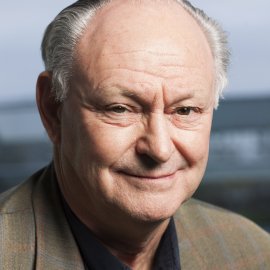Accounting, Birmingham University, United Kingdom

Janvier à Mars 2019
Keith Hoskin is currently Professor of Accounting at Birmingham Business School, and a Visiting Professor at the Business School, University of Essex. From 1999 to 2011 he was Professor of Strategy and Accounting at Warwick Business School, and from 1996 to 1999 Professor of Accounting at Manchester Management School, at the University of Manchester Institute of Science and Technology. He has lectured widely in Britain and beyond, and has previously held posts as a Visiting Professor at the University of California, Berkeley, Case Western Reserve University, the University of Venice, and the University of Bologna, as well as a Simon Fellowship in 1995-6 at the University of Manchester.
He served as a member of the UK Research Assessment Exercise (RAE) panels for Accounting and Finance in 2001 and 2008, and as Chair of the UK Conference of Professors of Accounting and Finance (2008-2010). He has also held a range of major university administrative posts, and has long experience as an External Examiner for degree programmes and PhD candidates. He was also (1998-2007) a member of the Learning and Professional Development Board of the Institute of Chartered Accountants in England and Wales. He was named as Distinguished Accounting Academic for 2011 by the British Accounting Association.
His current major research and publication interests are in the historical-theoretical study of accounting, management and strategy. They are focused theoretically on (i) developing better understandings of the perennial accounting function of naming and counting and the different forms that takes, down to the present and (ii) the relations of the shifting forms of this function to modes of ‘acting on the actions of others’, particularly in the shifting forms we name as ‘managing’ and ‘strategising’. The overall objective of this work is to construct a new historical-theoretical frame for conceptualizing management and accounting beyond supposed groundings in economics and other modern human sciences.
Accounting as Naming and Counting Truth-Form: from ancient Mesopotamia to the modern disciplinary knowledge world
Keith Hoskin’s research agenda is wide-ranging and moving across both disciplinary and ‘arts versus humanities versus human sciences’ boundaries. It focuses on taking forward the kinds of analysis developed by Michel Foucault across his oeuvre, and to a lesser extent those developed by Erwin Panofsky.
He proposes particularly to work on and discuss the ways in which modern modes of managing via accounting get developed in homologous ways in the ‘governmental management’ of the state and the ‘managerial governing’ of the multidivisional and now transnational modern business enterprise. This entails both close historical re-reading of key episodes in the US development of modern management to specify the precise forms of management and accounting innovation developed by the West Point graduates/pioneers of modern management, and the completion of a book-length study of the overall story of how modern business and ‘governmental’ management came about.
The second strand of work which he propose to work on is concerned with how we may need to rethink ‘discourse analysis’, and particularly organizational discourse analysis, beyond the major current focus on ‘talk and text’, a focus which as yet does not give due attention to the roles played the "non-glottographic" statement form, whose first exemplar was the clay-tablet accounting of ancient Mesopotamia, and which is now articulated throughout the charts, graphs, equations and models so central to the making of truth claims across the modern human and physical science disciplines and to the formulating of the 'economic truth-claims' which inform today's business and political decisions. In these ways Keith Hoskin would be able to prosecute the latest, still emergent, versions of his overall concern to continue the project that Foucault described as a ‘critical history of thought’: and to do so in ways that he believes stay true to both the methodology and the vision that Foucault articulated as one of the most significant and disruptive ‘founders of discursivity’ of the post-Enlightenment era.